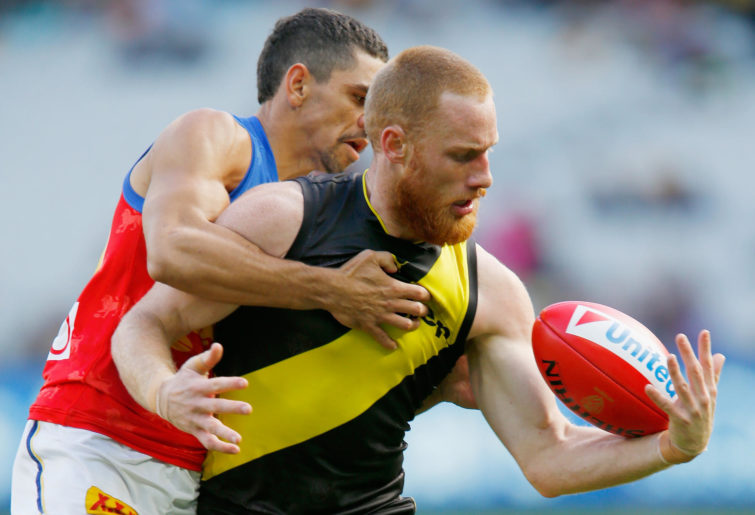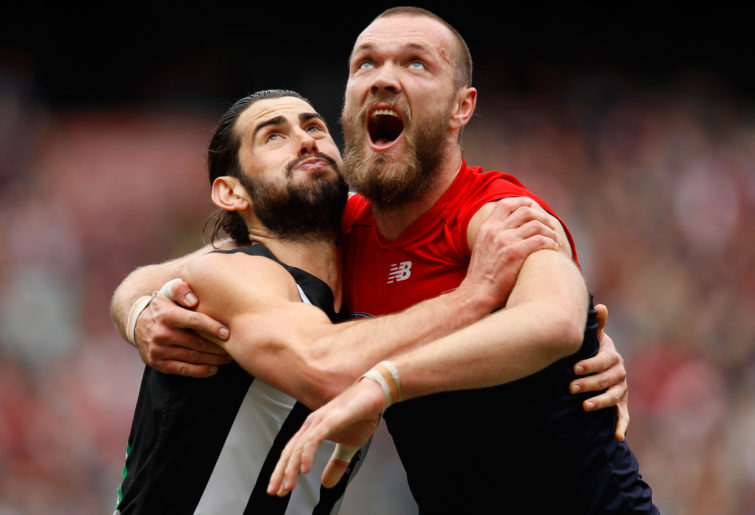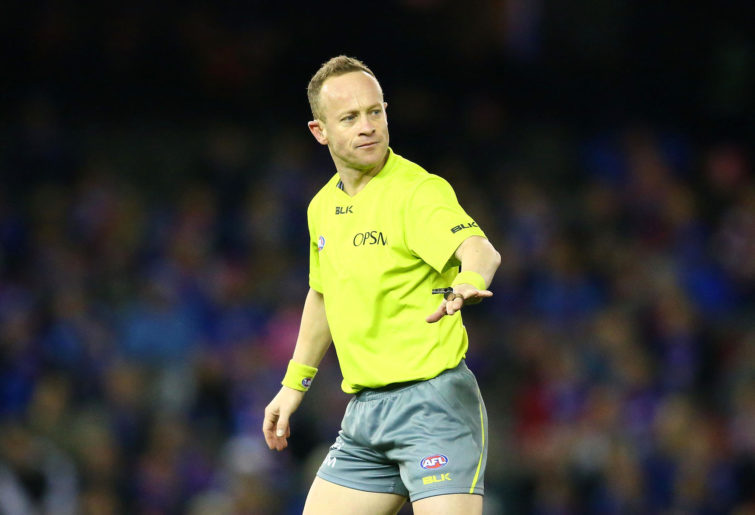This article is not to berate the AFL umpires this season, or complain about how there’s a conspiracy against your team.
It’s to discuss the actual rules of the comp, how they are being adjudicated, why they’re seemingly annoying all of us and how they could be either improved or removed for the good of the game.
The game of Aussie rules at the professional level is being turned into something it’s never been before through umpiring interpretations, mid-season knee jerk reactions and over officiating. And judging by the 13,000 odd comments on the umpiring in the Dons versus Lions blog, I reckon most of you agree.
Let’s kick off with the big banana peel. I’m sorry, I know it’s been discussed ad nauseam, but I thought I’d get it out of the way first.
Holding the ball and incorrect disposal
These are the actual rules as they appear in the rule book.
17.6.2 Free Kicks – Holding the Ball: Prior Opportunity – Where a Player in Possession of the Football has had Prior Opportunity, a Free Kick shall be awarded if that Player does not Correctly Dispose of the football immediately when they are Legally Tackled.
17.6.3 Free Kicks – Holding the Ball: Incorrect Disposal – Where a Player in Possession of the Football has not had Prior Opportunity, a Free Kick shall be awarded if that Player elects to Incorrectly Dispose of the football when Legally Tackled. For the avoidance of doubt, a Player does not elect to Incorrectly Dispose of the football when: (a) the Player genuinely attempts to Correctly Dispose of the football; (b) the Legal Tackle causes the football to be dislodged from the Player’s possession.
Good luck to the umpires trying to correctly adjudicate this 100 per cent of the time. The part of the incorrect disposal rule that causes all the trouble is where it states the umpire needs to make a call on whether or not the player has elected to dispose of the ball correctly or not even without prior, that’s outright impossible. The grey area needs to be removed somehow. That however is not as easy as it would seem.
The issue is that if we remove the part of the rule where the umpire has to judge the intentions of the player, then I am 100 per cent sure players will just pick the ball up and throw it, they do it now and that will only get worse.
Is the answer to do away with prior? I also see this causing problems, namely the game will turn into a rolling maul.
At the very least, the umps need to be giving prior opportunity. Officiating that properly would go a long way to fixing this rule. The more I look at the rule, the further away an answer to the question seems to be.

(Photo by Darrian Traynor/Getty Images)
Front-on contact
You might all find this hard to believe, but I cannot find a rule in the AFL rulebook for front-on contact concerning players running back with the flight intending to spoil. It also makes no mention of a player taking his eyes off the ball when attempting to spoil. The rule it seems is to actually protect the player with his head over the ball, a completely different situation.
The actual rule is…
17.5.1 Spirit and Intention – the Player whose sole objective is to contest or spoil a Mark shall be permitted to do so [or] A player that bumps or makes forceful contact to an opposition Player from front-on when that Player has their head down over the football shall have a free kicked paid against them.
There’s also this…
17.5.3 Permitted Contact – Contact in a Marking contest will be permitted if such contact is incidental and the Player is legitimately Marking, attempting to Mark, spoiling or attempting to spoil the football.
My reading of that is that the player running back with the flight is allowed to take his eyes off the ball and make incidental contact in the marking contest, as long as he doesn’t charge the player or make contact to the head.
It could be argued that a slight touch to the head is incidental in the same way that when a bloke cops a full blown knee to the back of the head in a marking contest is incidental.
According to these rules, everything else is allowed, everything including putting your hands in the player’s chest as you go backwards. Sure you can’t push them, but you can use them as a reference point.
This is just something they don’t need to call. It’s play on at least 50 per cent of the time, and when it’s not it’s either charging, high or chopping the arms, not front-on contact.
The ruling as it’s written, running in from the side and the front should be adjudicated exactly the same way. You are allowed to push your opponent out when the ball is within five metres, so if you turn your back and get a spoil in, that’s legal. If you put your hands anywhere other than the head or the back and you don’t push the other player backwards, it’s legal. Even a slight touch to the shoulder or the head could be considered legal depending on your definition of incidental. They’re calling a rule that doesn’t exist as far as I can tell.
Ruck contest frees
I won’t bore you with the myriad rules around ruck contests but this one sticks out.
17.4.3 Free Kicks – Ruck Contests – A field Umpire shall award a Free Kick in a Ruck contest against a Player where the Player: (b) unduly pushes or bumps an opposition Ruck;
Could this be any more vague? It should be the ruckman’s responsibility to stay on his feet. If he falls, slips or is pushed over by a bigger stronger or more skillful ruckman after the ball has left the boundary umpire’s hands then it should be play on, bad luck, get bigger and stronger or play at a lower level. Of course prohibited and rough conduct rules as well as push in the back still apply but other than that it’s game on.
This one’s an easy one. Just get rid of the rule.

(Photo by Michael Willson/AFL Media/Getty Images)
After-the-contest frees resulting in a kick for goal
Think the Tom Papley free against Hawthorn. This isn’t a direct comment on the Swans or the Hawks, let’s not turn it into that.
15.6.2 After the Kick – After a field Umpire has signaled that play has come to an end, any field Umpire may award a Free Kick to any Player after a Player has Kicked for Goal but before the field Umpire has signaled ‘All Clear’ or ‘Touched All Clear’. In such cases, the following shall apply:
(a) if the Player awarded the Free Kick is playing for the Attacking Team and a Goal is Kicked, the field Umpire shall signal ‘All Clear’ and a Goal shall be recorded
I bring this rule up because it is the most severe penalty short of being sent off or reported in the whole game of Aussie rules and I think it needs looking at.
Upon reading this rule 11 times and watching the vision 11 more, I’ve taken it to mean that the Papley decision was correct. The call was a push in the back and was there. However, it probably should have gone back the other way when Callum Sinclair went down immediately afterwards because the all clear hadn’t yet been given. Regardless, the punishment doesn’t match the crime.
The Papley and Sinclair infringements were virtually identical, yet one results in a certain goal and one results in a kick out from full back – big difference.
I run the “what if it decided a grand final” rule and this fails. I’m in favour of a rule change here. Let’s award the goal, take the ball back to centre and take the free from there. Goals are precious. This is the only rule in the game that practically guarantees a goal from a free kick every time and it can be milked reasonably easily. Let’s just remove the huge advantage it gives a team.
Blocks behind play
Again, there’s not specific rule here.
18.1 SPIRIT AND INTENTION After a Mark or Free Kick has been awarded to a Player, a Fifty Metre Penalty will be awarded against the opposing Team that unduly delays or impedes the play or behaves in an unsportsmanlike manner. – (f) engages in any other conduct for which a Free Kick would ordinarily be awarded.
Nowhere does it say that a player is not allowed to block behind play, step into a player’s path off the ball or basically make a nuisance of themselves.
There are rules like this for marking contests and there’s also shepherding rules that say it’s legal in the right circumstance but I contend that it’s a players responsibility to be aware of their surroundings. If the block doesn’t come under the rough or prohibited contact rule then it’s not a free. Soft free kicks given to a player that seemingly falls over at the slightest nudge behind play really grinds my gears. If you can’t stay on your feet, this isn’t the game for you.
Aussie rules is a physical, tactical, combative, 360-degree sport that happens all over a large field, not just within 50 metres of the contest. A player blocking an opponent up the field could be just as important in a coach’s tactical arsenal as an on-baller going from stoppage to stoppage.
This rule, especially the unsportsmanlike behaviour component is uber grey and allows the umpires (looking at you, Razor “look at me” Ray Chamberlain) too much room for interpretation and allows them to inject themselves into games unnecessarily.

(Photo: Scott Barbour/Getty Images)
Players can be Oscar-worthy actors, they’ll flop when they think it will result in a penalty. That in itself is unsportsmanlike so should result in a 50-metre back the other way if we’re really following the rule book. I’m saying just leave it alone, make them stay on their feet when possible, don’t reward a dive.
If it’s high, or someone’s thumped someone off the ball there’s rough and prohibited contact laws to deal with any situation that might come up.
The fact that so many of these penalties result in either downfield frees or harsh 50-metre penalties is a part of the sport we could do without. If you’re not aware of big Shane Mumford watching you, then that’s your bad luck I say. Welcome to the grass.
Fifty-metre penalties
Fifty-metre penalties are to harsh on a most occasions. They put umpiring decisions at centre stage and they have too big an impact on games. Paying this massive penalty as much as they do often actually serves to make the inevitable 50 they miss to your team even more infuriating. It’s a big stick and it’s wielded to often for infringements that are quite minor.
A new 25-metre penalty could be introduced. It’s been paid in the SANFL for years and is an appropriate penalty for frees like accidental incursion into the zone or accidentally stepping over the mark. Again, goals are precious. We shouldn’t be putting players directly in front for little mistakes. This would give the umpire a way to have less impact on results. By all means keep the 50, but use it sparingly.
Summary
Often putting something down on paper clarifies things. As I wrote this, I began to think that the game is just seriously over officiated, there are too many rules that are open to interpretation and there are regular misuses, overuses and misses of the 50-metre penalty.
These rules and decisions are being paid every week, deciding games every week, causing hair loss every week, and for the most part the solution seems simple. Just pay the frees as they’re written in the book and stay out of it when you can if you’re an umpire.
I do unfortunately fear we will have to live with holding the ball free kicks. I don’t have the answer there, but the rest can be fixed and perhaps with less frees paid and less controversy we can accept some questionable holding the ball calls and get back to actually enjoying our teams play.
The game doesn’t need more rules, it needs less rules, less umpire interference and less severity of punishments for minor infringements. But it’s not just this. We need to stop rewarding players that go to ground. This is a major blight on the game and something I didn’t expect to be writing about when I penned this article. It’s also something the AFL has largely ignored but could easily stamp out with fines and suspensions.
I want to watch footy, not umpires and actors.































































































